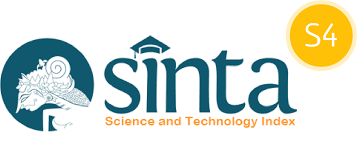Pengaruh Pendidikan Terhadap Tingkat Kesehatan Masyarakat Kecamatan Suragala Kabupaten Lombok Timur Menggunakan Algoritma Random Forest
DOI:
https://doi.org/10.29408/jit.v7i2.26352Keywords:
Public Health, Random ForestAbstract
SDGs are a global concern of the international community, including the Indonesian nation. There are many activities carried out by the international community to address this SDGs issue. Starting from real actions in the field to a continuous data collection process. In Indonesia, data collection has been carried out repeatedly, but the follow-up to each data collection is felt to be lacking, therefore Hamzanwadi University, using the Gemilang Village Thematic KKN application, has also played an active role in the data collection process. However, up to now, information about data collection results and follow-up actions has not been provided properly, in fact none of the data collection results have been processed to obtain clear and measurable information. Through internal higher education research carried out by Hamzanwadi University, an attempt was made to carry out research starting with the SDGs data processing process, namely education and health, to provide knowledge and information about whether or not there is an influence of education on the health of the people of Suralaga District, East Lombok Regency, so that if the influence If education plays a significant role, the Suralaga District Government can take concrete steps to improve it in the future. From the results of data processing it can be concluded that the influence of education on the level of public health is very high, using 90% training data and 10% testing data can achieve an accuracy of 88.61%, which means 700 data show a positive trend of education on the level of public health
References
Agustiningrum, C. I., Gata, W., Nurfalah, R., & Radiyah, U. (2020). KOMPARASI ALGORITMA RANDOM FOREST , RANDOM FOREST DAN SVM UNTUK MEMPREDIKSI NIAT. 20(2).
Imran, B., Subki, A., Yani, A., Alfian, M. R., Engineering, I., Engineering, S., & Mataram, U. T. (2019). DATA MINING USING RANDOM FOREST , NAÏVE BAYES , AND ADABOOST MODELS FOR PREDICTION AND CLASSIFICATION OF BENIGN AND. 37–46.
Veronica Retno Sari, F. F. (2020). PERBANDINGAN PREDIKSI KUALITAS KOPI ARABIKA DENGAN MENGGUNAKAN ALGORITMA SGD, RANDOM FOREST DAN NAIVE BAYES. EDUMATIC, 4(2), 1–9. https://doi.org/10.29408/edumatic.v4i2.2202
Azhari, M. (2021). Perbandingan Akurasi , Recall , dan Presisi Klasifikasi pada Algoritma C4.5,Random Forest, SVM, dan
Naive Bayes. 5(April), 640–651. https://doi.org/10.30865/mib.v5i2.2937
Samosir, A., Hasibuan, M., Justino, W. E., & Hariyono, T. (2021). Komparasi Algoritma Random Forest , Naïve Bayes dan K- Nearest Neighbor Dalam klasifikasi Data Penyakit Jantung. 214–222.
Rini, L. S. (2021). Prediksi Penerima Beasiswa dengan Menggunakan Teknik Data Mining di Universitas Muhammadiyah Pringsewu. 87–94.
Vimal, V. J. S., Mi, M. K., & Lee, Y. (2021). AI ‑ based smart prediction of clinical disease using random forest classifier and Naive Bayes. The Journal of Supercomputing, 77(5), 5198–5219. https://doi.org/10.1007/s11227-020-03481-x
Ramdani. (2022). Perbandingan Metode Random Forest Dan Random Forest Untuk Menentukan Prestasi Belajar Siswa Pada Jurusan RPL (Studi Kasus SMK Swasta Siti Banun Sigambal). 2, 80–88.
Nalatissifa, H., Gata, W., Diantika, S., & Nisa, K. (2021). Perbandingan Kinerja Algoritma Klasifikasi Random Forest , Support Vector Machine ( SVM ), dan Random Forest untuk Prediksi Ketidakhadiran di Tempat Kerja. 5(4), 578–584.
Firmansyah, A. (2022). Komparasi Akurasi Pada Naïve Bayes Dan Random Forest Dalam Klasifikasi Penyakit Liver Comparison of Accuracy in Naïve Bayes and Random Forests in Classification of Liver Disease. 7(January), 81–89.
Alhabib, I., Faqih, A., & Dikananda, F. (2022). Komparasi Metode Deep Learning , Naïve Bayes dan Random Forest untuk Prediksi Penyakit Jantung. 6(2), 176–185.
Suandi, A. (2022). Klasifikasi, Machine Learning, Naïve Bayes, Random Forest, PIP. 10(2).
Irawan, D., Perkasa, E. B., Wahyuningsih, D., & Helmund, E. (2021). Perbandingan Klasifikasi SMS Berbasis Support Vector Machine , Random Forest Classifier , Random Forest dan Bagging Classifier. 10, 432–437.
Yahya, Nurhidayati and A. Suherman, “Prediksi Tingkat Kesehatan Masyakarat Berdasarkan Penggunaan Alat Kontrasepsi Menggunakan Algoritma Random Forest,” Inform. dan Teknol., vol. 7, no. 1, 2024..
Putri, S. U. (n.d.). Implementasi Data Mining Untuk Prediksi Penyakit Diabetes. 2(1), 39–46.
Wijaya, Y. A., Bahtiar, A., Nining, R., Akuntansi, K., Tinggi, S., Informatika, M., & Cirebon, K. (2021). Analisa Klasifikasi menggunakan Algoritma Decision Tree pada Data Log Firewall Jurnal Sistem Informasi dan Manajemen. 9(3).
Hapsari, T. D., Malik, A., Simbolon, E. F., & Ariawan, I. (2022). Classification of marine mammals based on nucleotides using machine learning. 11(2), 62–70.
Tri widianti, J., Alfian, F. Y., & Prasojo, M. (2021). Perbandingan Metode Data Mining Untuk Prediksi Prestasi Siswa Tingkat Pendidikan Menengah Kejuruan Pada Sekolah Menengah Kejuruan Negeri ( SMKN 1 ) Gadingrejo Pringsewu Lampung. 1(Smkn 1), 126–133.
Pinelis, M., & Ruppert, D. (2022). ScienceDirect. The Journal of Finance and Data Science, 8, 35–54. https://doi.org/10.1016/j.jfds.2021.12.001
Ath, S., Al, T., Darmawan, D., Fahmi, N., Hakim, A. , Qibtiyya, M. Al, & Syafei, N. S. (2022). Jurnal Teknologi Terpadu HYBRID MACHINE LEARNING MODEL UNTUK MEMPREDIKSI PENYAKIT JANTUNG DENGAN METODE LOGISTIC REGRESSION DAN RANDOM. 8(1), 40–46.
Models, K., Nam, S., & Hur, J. (2018). Probabilistic Forecasting Model of Solar Power Outputs Based on the Naïve Bayes Classifier and. https://doi.org/10.3390/en11112982
Residencia, A. (2019). KLASIFIKASI KELAYAKAN PESERTA PENGAJUAN KREDIT RUMAH DENGAN ALGORITMA NAÏVE BAYES DI PERUMAHAN AZZURA RESIDENCIA. 9, 43–48.
Downloads
Published
How to Cite
Issue
Section
License
Copyright (c) 2024 Infotek: Jurnal Informatika dan Teknologi

This work is licensed under a Creative Commons Attribution 4.0 International License.
Semua tulisan pada jurnal ini menjadi tanggung jawab penuh penulis. Jurnal Infotek memberikan akses terbuka terhadap siapapun agar informasi dan temuan pada artikel tersebut bermanfaat bagi semua orang. Jurnal Infotek ini dapat diakses dan diunduh secara gratis, tanpa dipungut biaya sesuai dengan lisense creative commons yang digunakan.
Jurnal Infotek is licensed under a Creative Commons Attribution 4.0 International License.
Statistik Pengunjung




